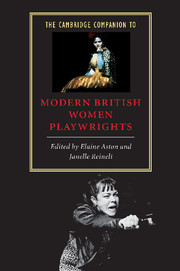Book contents
- Frontmatter
- 1 A century in view: from suffrage to the 1990s
- Part I Retrospectives
- Part II National tensions and intersections
- Part III The question of the canon
- Editors’ note
- 10 Pam Gems: body politics and biography
- 11 Caryl Churchill and the politics of style
- 12 Violence, abuse and gender relations in the plays of Sarah Daniels
- Part IV The subject of identity
- Index
Editors’ note
from Part III - The question of the canon
Published online by Cambridge University Press: 28 May 2006
- Frontmatter
- 1 A century in view: from suffrage to the 1990s
- Part I Retrospectives
- Part II National tensions and intersections
- Part III The question of the canon
- Editors’ note
- 10 Pam Gems: body politics and biography
- 11 Caryl Churchill and the politics of style
- 12 Violence, abuse and gender relations in the plays of Sarah Daniels
- Part IV The subject of identity
- Index
Summary
Editors’ note
As we began to plan this volume - what and who to include, how to present the material, what categories would be most workable - we kept stumbling over what we came to refer to as the 'question of the canon'. Defined as the 'indispensable' works which must be included under the subject matter of the title, one way of understanding canonicity is to ask what plays simply could not be excluded from this discussion of modern British women playwrights. However, that approach already begs the question of the canon because it presupposes an established and undisputed authoritative list of such works that has widespread consensus. As the Women’s Movement has been militant in pointing out, 'canons' are highly questionable constructs, historically set by men and power elites to ensure repetition and perpetuation of works which reinforce the dominant ideology of a given culture. One of the early tasks, therefore, of Second Wave feminism’s academic women has been to challenge received notions of the canon. They worked to recover, and to insist on the acknowledgement and study of, women’s history, literature, art, and other accomplishments that had previously not enjoyed prominence or even discovery because of the emphasis on 'great works' by famous men (see Bennett, chapter 3, for an extended discussion of this point). Of course, the notion of 'great works' is no less fraught, since taste is as much a matter of fashion and power relations as it is of inherent value. In fact, as this book has argued as one of its premises (see our main introduction), value is a constantly changing matter, negotiated between the work and the historical moment from which it is viewed, not a fixed, timeless quality.
- Type
- Chapter
- Information
- The Cambridge Companion to Modern British Women Playwrights , pp. 152 - 156Publisher: Cambridge University PressPrint publication year: 2000

